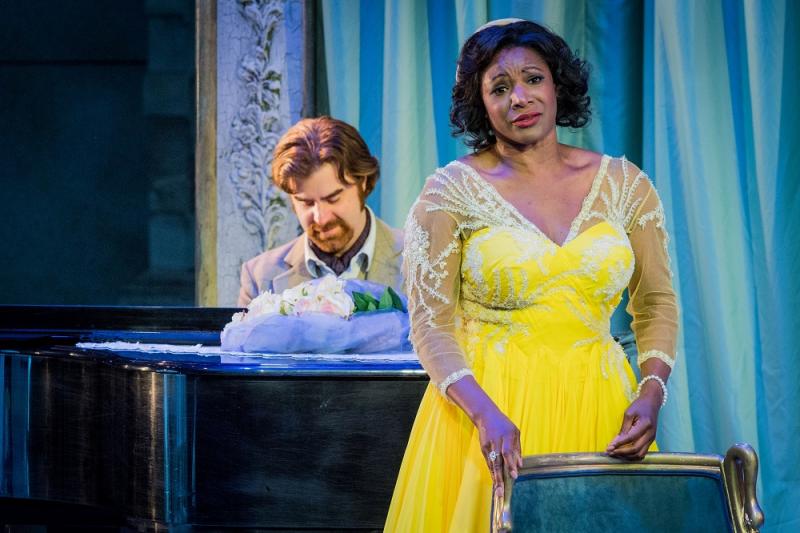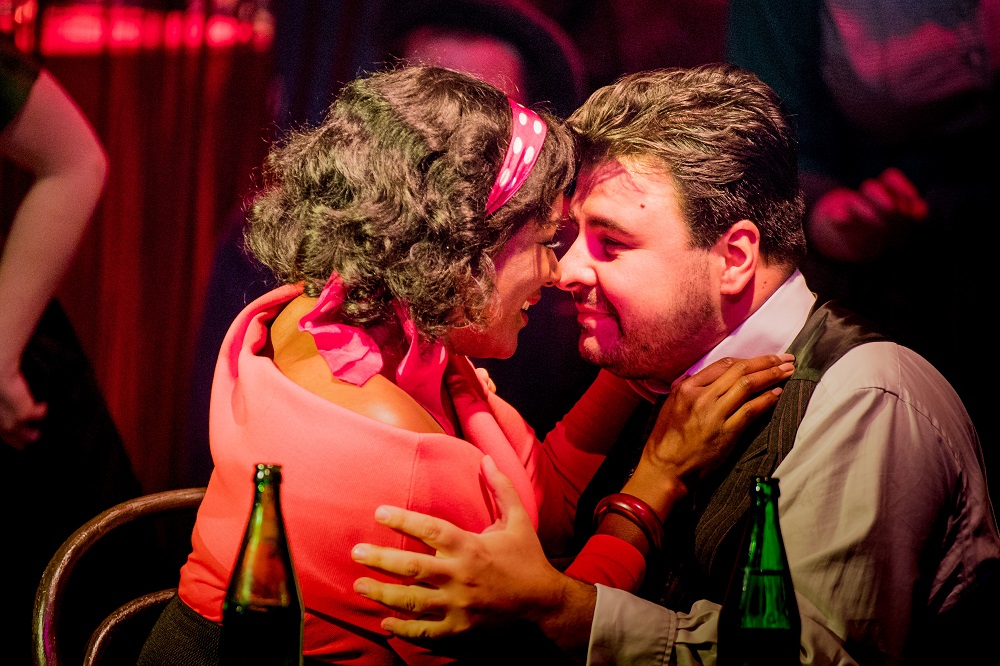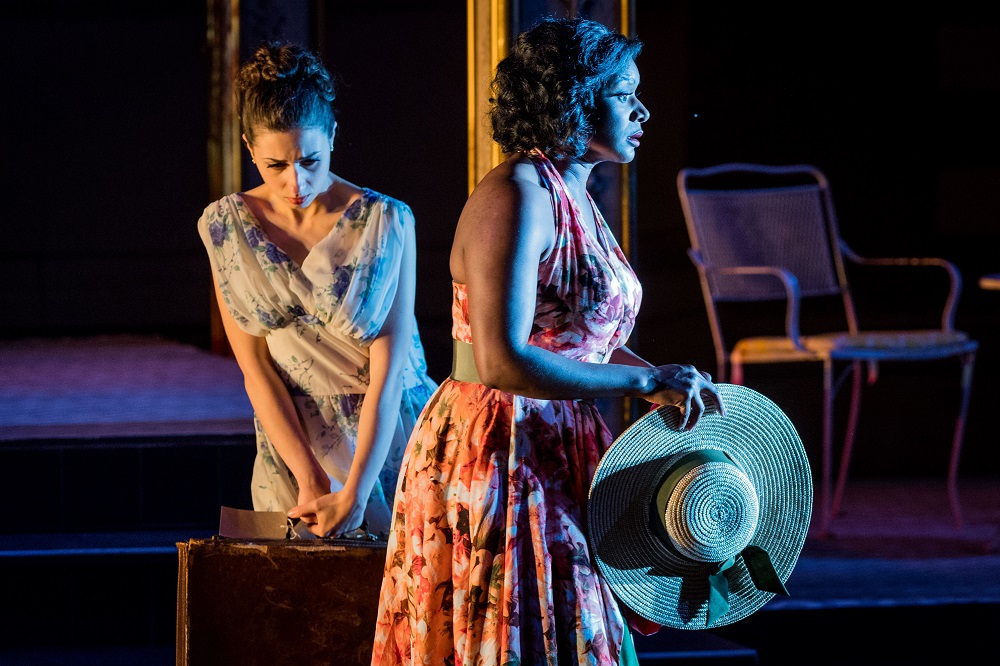La Rondine, Opera Holland Park | reviews, news & interviews
La Rondine, Opera Holland Park
La Rondine, Opera Holland Park
Elizabeth Llewellyn soars in Puccini's tuneful waltz-dream

When are the big international opera houses going to wake up to the great British talent that is Elizabeth Llewellyn? With her opulent soprano – shaded middle register, full bloom at the top, cutting chest voice – she was born to sing Verdi and Puccini, and her stage presence is undeniable from the moment she steps out.
The plot is light as thistledown: courtesan Magda finds true love sharing beers at a dance-hall, hesitates to tell her nice young man about her role in society, leaves him (no real spoiler involved) – Verdi's La traviata revisited in airier mode. OHP has been here before, in a production faithful to the soft Belle Époque decadence of the original setting. Martin Lloyd-Evans almost justifes his update by pulling off the big coup of the evening, with a little help from takis's designs and Martin Howland's lighting: the prim salon with its pretty pastel dresses for the bit-part girls offsetting heroine Magda in bold canary yellow gives way to Bullier's urban, apache raucousness, accommodating our courtesan transformed in leather jacket and jeans (Llewellyn and Matteo Lippi in Act Two pictured below). There's a problem here, though, when Puccini does a Gallic-Italian take on Der Rosenkavalier or Die Fledermaus with a string of waltzes; the chorus is game to do some very non-waltzy moves to it, courtesy of movement director Steve Elias, but it doesn't quite work.
 We also believe even less, given the post-war freedoms, in Magda sacrificing herself so readily to the demands of propriety and, Violetta-like, yielding her beloved Ruggero to the conventional demands of his mamma. It's always going to look like a weak cop-out to contemporary audiences ("I've lived between shame and riches, bye now") happening in double-quick time in a third act where Puccini has run low on the original melodies which power the first two – but doubly so in the update.
We also believe even less, given the post-war freedoms, in Magda sacrificing herself so readily to the demands of propriety and, Violetta-like, yielding her beloved Ruggero to the conventional demands of his mamma. It's always going to look like a weak cop-out to contemporary audiences ("I've lived between shame and riches, bye now") happening in double-quick time in a third act where Puccini has run low on the original melodies which power the first two – but doubly so in the update.
Never mind: what works here has most of the gem-like orchestral colours and vocal glamour it needs. Matthew Kofi Waldren is excellent at steering the deft mood-changes and easy lilt of the score; no doubt once he knows it better, he'll lift his head to give more cues to the singers above him. The chorus certainly needs a bit more help in the co-ordination of the typically Puccinian swagger of the second act (think Café Momus with added stridency and – later, in the first duet of the act between the new lovers – a delicious take on swooning Lehárishness).
 The lighter couple, caddish musician Prunier and maid Lisette (for which read Rosalinde's Adele from Die Fledermaus, a girl who also wants to go on the stage but here gets to fail at it), are decently taken by Stephen Aviss and Tereza Gevorgyan (pictured above with Llewellyn in Act Three). I'd have liked more light-tenor charm, though, from Aviss, who's perhaps too baritonal at times. But in Matteo Lippi we have the genuine Italian article for the cipherish Ruggero: affable of manner, all at one loudish dynamic level, perhaps, but the top notes are never in doubt.
The lighter couple, caddish musician Prunier and maid Lisette (for which read Rosalinde's Adele from Die Fledermaus, a girl who also wants to go on the stage but here gets to fail at it), are decently taken by Stephen Aviss and Tereza Gevorgyan (pictured above with Llewellyn in Act Three). I'd have liked more light-tenor charm, though, from Aviss, who's perhaps too baritonal at times. But in Matteo Lippi we have the genuine Italian article for the cipherish Ruggero: affable of manner, all at one loudish dynamic level, perhaps, but the top notes are never in doubt.
Nor are Llewellyn's, and our hearts are with her from the start. There isn't much depth to be found – this rondine (swallow) is no traviata – but she does convey, and often thrillingly, the idea that "love is always new". And with the possibility of real swallows silhouetted above the awning, and peacock cries in time for the final scene on the French riviera, this most culinary of opera/operettas is a perfect fit for its west London setting.
Add comment
The future of Arts Journalism
You can stop theartsdesk.com closing!
We urgently need financing to survive. Our fundraising drive has thus far raised £49,000 but we need to reach £100,000 or we will be forced to close. Please contribute here: https://gofund.me/c3f6033d
And if you can forward this information to anyone who might assist, we’d be grateful.

Subscribe to theartsdesk.com
Thank you for continuing to read our work on theartsdesk.com. For unlimited access to every article in its entirety, including our archive of more than 15,000 pieces, we're asking for £5 per month or £40 per year. We feel it's a very good deal, and hope you do too.
To take a subscription now simply click here.
And if you're looking for that extra gift for a friend or family member, why not treat them to a theartsdesk.com gift subscription?
more Opera
 Albert Herring, English National Opera review - a great comedy with depths fully realised
Britten’s delight was never made for the Coliseum, but it works on its first outing there
Albert Herring, English National Opera review - a great comedy with depths fully realised
Britten’s delight was never made for the Coliseum, but it works on its first outing there
 Carmen, English National Opera review - not quite dangerous
Hopes for Niamh O’Sullivan only partly fulfilled, though much good singing throughout
Carmen, English National Opera review - not quite dangerous
Hopes for Niamh O’Sullivan only partly fulfilled, though much good singing throughout
 Giustino, Linbury Theatre review - a stylish account of a slight opera
Gods, mortals and monsters do battle in Handel's charming drama
Giustino, Linbury Theatre review - a stylish account of a slight opera
Gods, mortals and monsters do battle in Handel's charming drama
 Susanna, Opera North review - hybrid staging of a Handel oratorio
Dance and signing complement outstanding singing in a story of virtue rewarded
Susanna, Opera North review - hybrid staging of a Handel oratorio
Dance and signing complement outstanding singing in a story of virtue rewarded
 Ariodante, Opéra Garnier, Paris review - a blast of Baroque beauty
A near-perfect night at the opera
Ariodante, Opéra Garnier, Paris review - a blast of Baroque beauty
A near-perfect night at the opera
 Cinderella/La Cenerentola, English National Opera review - the truth behind the tinsel
Appealing performances cut through hyperactive stagecraft
Cinderella/La Cenerentola, English National Opera review - the truth behind the tinsel
Appealing performances cut through hyperactive stagecraft
 Tosca, Royal Opera review - Ailyn Pérez steps in as the most vivid of divas
Jakub Hrůša’s multicoloured Puccini last night found a soprano to match
Tosca, Royal Opera review - Ailyn Pérez steps in as the most vivid of divas
Jakub Hrůša’s multicoloured Puccini last night found a soprano to match
 Tosca, Welsh National Opera review - a great company reduced to brilliance
The old warhorse made special by the basics
Tosca, Welsh National Opera review - a great company reduced to brilliance
The old warhorse made special by the basics
 BBC Proms: The Marriage of Figaro, Glyndebourne Festival review - merriment and menace
Strong Proms transfer for a robust and affecting show
BBC Proms: The Marriage of Figaro, Glyndebourne Festival review - merriment and menace
Strong Proms transfer for a robust and affecting show
 BBC Proms: Suor Angelica, LSO, Pappano review - earthly passion, heavenly grief
A Sister to remember blesses Puccini's convent tragedy
BBC Proms: Suor Angelica, LSO, Pappano review - earthly passion, heavenly grief
A Sister to remember blesses Puccini's convent tragedy
 Orpheus and Eurydice, Opera Queensland/SCO, Edinburgh International Festival 2025 review - dazzling, but distracting
Eye-popping acrobatics don’t always assist in Gluck’s quest for operatic truth
Orpheus and Eurydice, Opera Queensland/SCO, Edinburgh International Festival 2025 review - dazzling, but distracting
Eye-popping acrobatics don’t always assist in Gluck’s quest for operatic truth
 MARS, Irish National Opera review - silly space oddity with fun stretches
Cast, orchestra and production give Jennifer Walshe’s bold collage their all
MARS, Irish National Opera review - silly space oddity with fun stretches
Cast, orchestra and production give Jennifer Walshe’s bold collage their all

Comments
Absolutely right about